« August 2008 | HOME PAGE | October 2008 »
September 29, 2008
Kashgar Attack Not What It Seemed?
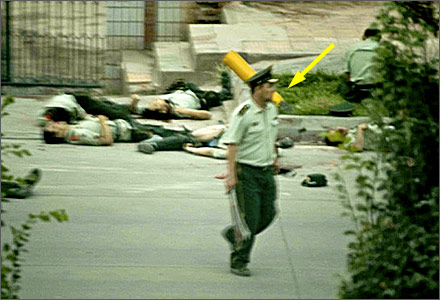
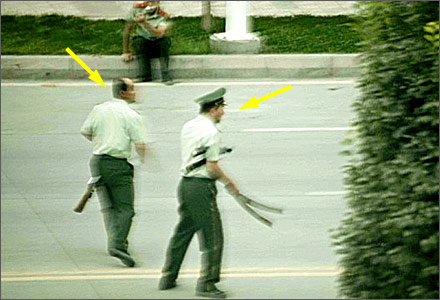
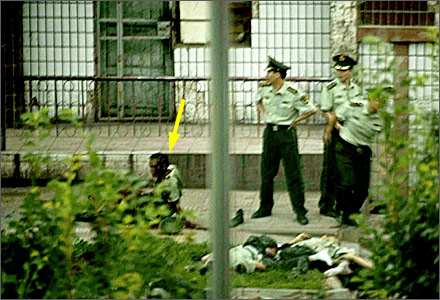
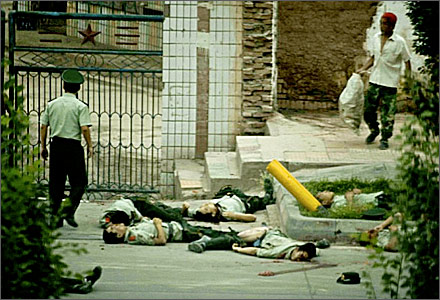
Last month's attack in Kashgar just a few days before the start of the Beijing Olympics was confusing from the start. It was grenades; no, a bomb; no, a truck and machetes. The attackers were finally identified as a 28 year-old taxi driver and a 33 year-old vegetable seller, both Uyghurs. Then, like most interesting stories in China, it faded from public view under a blanket of official silence.
But the New York Times kept digging, tracking down the tourist who took photos of the attack that later showed up on AP.
The photographer is remaining anonymous, but along with a travel companion he/she has given a personal account of the attack that doesn't really fit the official story:
The witnesses said that they heard no loud explosions and that the men wielding the machetes appeared to be paramilitary officers who were attacking other uniformed men.
That raises several questions: Why were the police wielding machetes? Were they retaliating against assailants who had managed to obtain official uniforms? Had the attackers infiltrated the police unit, or was this a conflict between police officers?
“It seemed that the policeman was fighting with another policeman,” one witness said. All of the witnesses spoke on condition of anonymity for fear of running afoul of the Chinese authorities....
At around 8 a.m. on Aug. 4, the photographer was packing his bags by the window when he heard a crashing sound, he said. When he looked up, he said, he saw a large truck career into a group of officers across the street after having just hit a short yellow pole.
The photographer said that the truck then hit a telephone or power pole and slammed into the front of the other hotel, the Yiquan, across the street. A man wearing a white short-sleeve shirt tumbled from the driver’s side, he said....
The tourists said the scene turned even more bizarre.
One or two men dressed in green uniforms took out machetes and began hacking away at one or two other men dressed in the same type of uniforms on the ground.
“A lot of confusion came when two gentlemen, it looked like they were military officers — they were wearing military uniforms, too — and it looked like they were hitting other military people on the ground with machetes,” the friend said.
“That instantly confused us,” he said. “All three of us were wondering: ‘Why are they hitting other military people?’ ”
The photographer said that there had been two men in green uniforms on their knees facing his hotel and their hands seemed to be bound behind their backs. Another uniformed man began hitting one of them with a machete, he said.
Of course, eyewitness accounts of traumatic events like the Kashgar attack are notoriously unreliable. Simply put, people see what they want to see when they can't figure out what's going on.
At the very least, though, this adds another level of complexity that we know nothing about. If the driver of the truck (the bloodied guy in the white shirt) was immobilized in the crash, then who were the two military officers getting hacked while their hands were bound behind their backs? Were the attacks coordinated with some of the officers? Were uniforms stolen?
My highly-tuned ethnic radar tells me the guy holding the machete in the photos above is probably a Uyghur, and there's also a slight chance that the guy with the rifle is Uyghur too. I've also highlighted what appears to be the bloodied attacker in the white shirt.
But none of that answers the question: what exactly happened in Kashgar? Be sure to check out this slideshow narrated by one of the eyewitnesses.
Doubt Arises in Account of an Attack in China
By EDWARD WONG
September 29, 2008
The New York Times
KASHGAR, China — Just days before the Olympic Games began in August, a truck plowed into a large group of paramilitary officers jogging in western China, sending bodies flying, Chinese officials said at the time.
They described the event as a terrorist attack carried out by two ethnic Uighur separatists aimed at disrupting the Olympics. After running over the officers, the men also attacked them with machetes and homemade explosives, officials said. At least 16 officers were killed, they said, in what appeared to be the deadliest assault in China since the 1990s.
But fresh accounts told to The New York Times by three foreign tourists who happened to be in the area challenge central parts of the official Chinese version of the events of Aug. 4 in Kashgar, a former Silk Road post in the western desert. One tourist took 27 photographs.
Among other discrepancies, the witnesses said that they heard no loud explosions and that the men wielding the machetes appeared to be paramilitary officers who were attacking other uniformed men.
That raises several questions: Why were the police wielding machetes? Were they retaliating against assailants who had managed to obtain official uniforms? Had the attackers infiltrated the police unit, or was this a conflict between police officers?
“It seemed that the policeman was fighting with another policeman,” one witness said. All of the witnesses spoke on condition of anonymity for fear of running afoul of the Chinese authorities.
Chinese officials have declined to say anything more about the event, which was the first in a series of four assaults in August in which officials blamed separatists in the Xinjiang autonomous region. The attacks left at least 22 security officers and one civilian dead, according to official reports.
On Aug. 5, the party secretary of Kashgar, Shi Dagang, said that the attack the previous day on the police officers, which also injured 16, was carried out by two Uighur men, a taxi driver and a vegetable seller. The Uighurs are a Turkic Muslim group that calls Xinjiang its homeland and often bridles at Han Chinese rule.
One man drove the truck, Mr. Shi said, and the other ran up to the scene with weapons. The attackers, who were arrested, had each tossed an explosive and when they were captured had a total of nine unused explosive devices, machetes, daggers and a homemade gun, he said.
He never mentioned attackers in security uniforms. Neither did reports by Xinhua, the state news agency. One publication, the North American edition of a Hong Kong newspaper, Ming Pao, did, citing police officials in Xinjiang, who now refuse to elaborate on the events.
Chinese officials have long sought to portray violence in Xinjiang as a black-and-white conflict, with separatist groups collectively known as the East Turkestan Islamic Movement carrying out attacks. Officials cite the threat of terrorism when imposing strict security measures on the region.
But the ambiguities of the scene described by the witnesses suggest that there could be different angles to the violence. When asked whether terrorists were involved, a Uighur man who on Friday drove past the scene of the attack said, “They say one thing, we say something else.” Other Uighurs say the attackers were acting on their own, perhaps out of a personal grievance.
The three witnesses said they had seen the events from the Barony Hotel, which sits across the street from a compound of the People’s Armed Police, China’s largest paramilitary force, and another hotel outside of which the attack occurred.
One tourist took photographs, three of which were distributed by The Associated Press in August. He showed 24 others to The Times.
At around 8 a.m. on Aug. 4, the photographer was packing his bags by the window when he heard a crashing sound, he said. When he looked up, he said, he saw a large truck career into a group of officers across the street after having just hit a short yellow pole.
Chinese officials said later that the truck had barreled into 70 officers jogging away from the compound.
The photographer said that the truck then hit a telephone or power pole and slammed into the front of the other hotel, the Yiquan, across the street. A man wearing a white short-sleeve shirt tumbled from the driver’s side, he said.
“He was pretty injured,” the photographer said. “He fell onto the ground after opening the door. He wasn’t getting up. He was crawling around for four or five seconds.”
The photographer raced into the hallway to get his traveling companions, a relative and a friend, from another room.
The two others had also heard the crash and were already in the hallway. All three dashed to the window in the photographer’s room. The photographer said he had been gone for about a minute. Back at the window, he said, he saw no sign of the truck driver.
The friend said: “The first thing I remember seeing was that truck in the wall in the building across the street. I saw a pile of about 15 people. All their limbs were twisted every which way. There was a gentleman whose head was pressed against the pavement with a big puddle of blood.”
“I remember just thinking, ‘It’s surreal,’ ” he said. “I had this surreal feeling: What is really happening?”
The tourists said the scene turned even more bizarre.
One or two men dressed in green uniforms took out machetes and began hacking away at one or two other men dressed in the same type of uniforms on the ground.
“A lot of confusion came when two gentlemen, it looked like they were military officers — they were wearing military uniforms, too — and it looked like they were hitting other military people on the ground with machetes,” the friend said.
“That instantly confused us,” he said. “All three of us were wondering: ‘Why are they hitting other military people?’ ”
The photographer grabbed a camera for the first time and crouched down by the window. His first photograph has a digital time stamp of 8:04 a.m., and his last is at 8:07 a.m. The first frames are blurry, and the action is mostly obscured by a tree. But it is clear that there are several police officers surrounding one or more figures by the sidewalk.
The photographer said that there had been two men in green uniforms on their knees facing his hotel and their hands seemed to be bound behind their backs. Another uniformed man began hitting one of them with a machete, he said.
“The guy who was receiving the hack was covered in blood,” he said. “A lot of the policemen were covered in blood. Some were walking around on the street pretty aimlessly. Some were sitting on the curb, in shock I guess. Some were running around holding their necks.”
The friend recalled a slightly different version of the event. He said he had seen two uniformed men with machetes hacking away at two men lying on their backs. “I do kind of remember one of them moving,” he said. “He was definitely injured but still kind of trying to squirm around.”
The relative also saw something different. He said a man in a green uniform walked from the direction of the truck. “A policeman who wasn’t injured ran over and started hitting him with a machete,” the relative said. “He hit him a few times, then this guy started fighting him back.”
After being hit several times by the machete, the uniformed man fell down, and at least one other police officer came over to kick him, the relative said.
It became clear to the tourists that the men with machetes were almost certainly paramilitary officers, and not insurgents, because they mingled freely with other officers on the scene.
While all this was happening, the three tourists said, a small bang came from the truck. It sounded like a car backfiring, the friend said. Black smoke billowed from the front of the truck.
The machete attack lasted a minute or two, the tourists said. One uniformed man then handed his machete to another uniformed man who had a machete, the friend said. One of the photographs shows a man walking around clutching two machetes in one hand. Another photograph shows a uniformed man carrying a rifle with a bayonet, a rare weapon in China.
Other officers were trying to disperse civilian onlookers, the tourists said. One of the officers saw the photographer with his camera in his hotel room window, the tourists said.
For about five hours after that, police officers locked down the hotel and went room to room questioning people, the tourists said. They seemed unthreatening, the tourists said, but they kept asking about photographs and checking cameras.
“They asked if we took any pictures; we said no,” the relative said. The tourists had stuffed the camera into a bag. “They asked if we sent any e-mails. I said no.”
The photographer said that while at breakfast, he saw white body bags on gurneys being wheeled to vans. In the afternoon, when people were finally allowed to leave the hotel, workers were spraying down the street with hoses, he said.
The truck was gone. Except for a bent pole across the street, there was no sign that anything had happened.
posted September 29, 2008 at 09:15 AM unofficial Xinjiang time | Comments (201)
September 25, 2008
AIR in Beijing
UPDATE Photos from last night's show:




I was up front by the left side of the stage, so I was only really able to see Nicolas Godin well. Jean-Benoît Dunckel was often hiding behind his piano and keyboards. Also, the security were being real dicks about not allowing photography, so I had to sneak these shots. The last one was just a trippy fluke, but it's my favorite.
The show was pretty good, in my opinion... about as good as you could expect AIR to be live. I don't really know what I was expecting. They played a set consisting of most of the fan favorites, with "Alone in Kyoto" and "Sexy Boy" as encores.
It's tough to be standing up, staring at the stage, and rocking out to slow, dreamy soundscapes. Anyway, I'm glad I went. The general consensus after the show seemed to be that AIR could never match the sonic excellence of their recordings in a live situation.
But still, how could anyone ever get tired of them saying "xie xie" into a vocoder? I'd say their first ever show in China was a success, if not mind-blowing.
••••
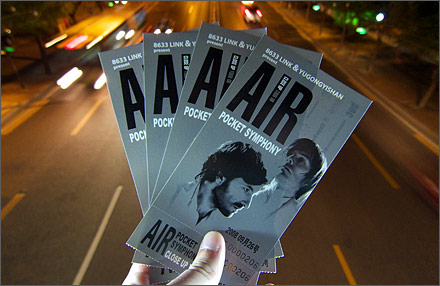
Click here if you want a pair of tickets to tonight's sold-out show!
Well, my monthly stipend from the CIA for authoring this blog has come in, and I've decided to treat myself to something nice. I've been a fan of AIR for almost ten years now, but have never had a chance to see them live... until now.
How cool is it that AIR is playing in Beijing? And not at the Worker's Stadium or Star Live, but at little ol' (new) Yugong Yishan. Sure, the tickets are expensive (Y550 in the pre-sale), but I'm considering this a once-in-a-lifetime opportunity.
Anyone else going? I'll try to take some photos and post them on Saturday along with a review of the show.
••••
P.S. Check out this RFA article on a topic near and dear to my heart... the rumor about free lunches for Muslims in Xinjiang during Ramadan. I guess it's not a rumor anymore.
posted September 25, 2008 at 07:40 PM unofficial Xinjiang time | Comments (32)
September 22, 2008
Xinjiang 2021 Watch: Pipeline Edition
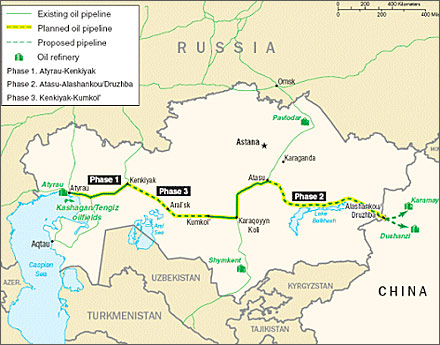
Two recent news items have reminded me once again of my Xinjiang 2021 scenario from back in 2006. For those of you who need to get up to date, I'll list all the 2021 updates down below.
If you'll recall, the scenario involved something to do with limiting mosque attendance and religious activities, cross-border terrorist attacks, and an important oil pipeline. The first item on that list was checked off two entries ago with "The Anti-Ramadan Campaign". (Go on, click the link.)
The second check mark comes from that pesky Hong Kong Information Centre for Human Rights and Democracy, which may or may not be a reliable source:
This Centre has learned that Xinjiang's border defence units suddenly increased their alert level from 3 to 1 yesterday because authorities have received an intelligence report saying that a major surprise attack could occur in the border area within the next few days. Ramadan, the Muslim month of fasting, is underway in Xinjiang. Because the "23 Explanatory Notes on Illegal Religious Activities" which the Chinese Communists drafted conflicts very seriously with the traditional Ramadan activities of Xinjiang's Muslims, a large-scale clash between the masses of the people and the Chinese Communist authorities could erupt at any time this month.
This Centre has learned that Xinjiang's border defence units were on level 1 alert during the Olympics, but the alert level was downgraded to 3 on 25 August. But border defence units suddenly raised their alert level to 1 yesterday.
It seems entirely plausible to me... but that doesn't really reflect on whether it's true or not. Besides, even if the border patrol has gone on high alert, that's another level of reality completely removed from an actual attack across the border.
Speaking of which, I've got a "fact of the week" for all of you from a recent China Daily article about the complete normalcy of life in Kashgar this Ramadan season. (Check out The New Dominion's deep analysis.) Some of you may know that Xinjiang borders eight nations, but did you know that:
Kashgar prefecture borders Pakistan, Afghanistan, India, Tajikistan and Kirghizstan.
Even I didn't know that all of those countries (at least 3 of which are bad-ass) touched Kasghar prefecture, which is small by Xinjiang standards.
Where were we? Right, number three on the list... something to do with an oil pipeline. From Business Week comes a look at how Russia's war with Georgia is affecting the massive oil industry in Kazakhstan, and how China might be the ultimate winner:
On the scorching, scrub-dotted steppe along the east coast of the Caspian Sea, a Chevron-led team is opening up the taps on 50 new wells at the supergiant Tengiz oil field. Fifteen years after snagging rights to the Kazakhstan field, the U.S. oil giant is at last doubling production to 540,000 barrels a day, its largest single source of oil in the world....Yet getting the oil out of the landlocked country has always been a tricky affair: Russia has blocked, stalled, and restricted the flow of Tengiz oil through its territory since the first day Chevron took over the field. Teaming up with the Kazakhs, Chevron has resorted to shipping some of its oil across the Caspian Sea to Baku, the capital of Azerbaijan, and then via pipeline and railroad to Georgia's Black Sea coast in an effort to avoid Russia. These days, Chevron does ship most of its oil through Russia, but for safety's sake it hopes to build a long, new pipeline across Georgia and export more through that route.
The plans for the corridor, though, were drawn before Russia's summer romp through Georgia. Suddenly, that tiny Caucasian state--embraced by Washington in a bold plan to pry it away from Moscow's grip--seems much less secure....
Next year, China will finish a 400,000-barrel-a-day pipeline from Kazakhstan into its province of Xinjiang. If blockages to shipment through Russia and the Caucasus persist, China may be the only option for Kazakhstan's increased production. It would be ironic if after 15 years of struggle neither Russia nor the U.S. were to be the victor over Central Asia's oil and natural gas, and instead the spoils ended up going East.
Yes, that certainly would be interesting, because it would mean that a major U.S. oil project run by Chevron in Kazakhstan would be transporting its oil across China. (It certainly seems more likely than a Pakistan pipeline at the moment.) Aside from all the political and economic deal making a U.S. pipeline across China would entail, it would also create a very inviting target (or more likely, targets) for the East Turkestan Independence crowd, Al Qaeda, the Taliban, and whoever else has beef.
Just imagine it... rivers of oil flowing across the mountains from a Muslim country into the lands of a godless oppressor, made possible with the help of the Great Satan. And all controlled by Jews, of course. Who wouldn't want to blow that thing up?
You can read the full text of the articles below.
••••
Previous 2021 Updates:
2006/12: Xinjiang 2021
2007/01: China's al-Qaeda
2007/02: High Noon in Xinjiang
2008/04: Xinjiang 2021 Watch
2008/09: The Anti-Ramadan Campaign
CHINA'S XINJIANG BORDER TROOPS RAISE ALERT LEVEL AMID THREAT OF ATTACKS
BBC Monitoring International Reports
September 18, 2008 Thursday
Text of report by Hong Kong Information Centre for Human Rights and Democracy on 18 September
["Xinjiang Border Defence Units Suddenly Went To Level 1 Alert Yesterday"]
18 Sep - This Centre has learned that Xinjiang's border defence units suddenly increased their alert level from 3 to 1 yesterday because authorities have received an intelligence report saying that a major surprise attack could occur in the border area within the next few days. Ramadan, the Muslim month of fasting, is underway in Xinjiang. Because the "23 Explanatory Notes on Illegal Religious Activities" which the Chinese Communists drafted conflicts very seriously with the traditional Ramadan activities of Xinjiang's Muslims, a large-scale clash between the masses of the people and the Chinese Communist authorities could erupt at any time this month.
This Centre has learned that Xinjiang's border defence units were on level 1 alert during the Olympics, but the alert level was downgraded to 3 on 25 August. But border defence units suddenly raised their alert level to 1 yesterday. An informed source indicated that authorities have received an intelligence report saying that a cross-border armed surprise attack could occur in the border area within the next few days. At alert level 3, Xinjiang's border defence units cancelled rest leave and trips to visit family, and imposed controls on its personnel leaving the unit area. To enter level 1 alert status means to be battle-ready, mobilizing resources to the maximum for round the clock vigilance.
Ramadan, from 2 September to 1 October this year, is a major event for Xinjiang's Muslims. Many Muslims do fast during this time, eating and drinking nothing from sunrise to sunset. The Chinese Communists always restrict fasting for the reason that they say fasting will disrupt work and production. The restrictions often lead to large-scale and bloody clashes between Xinjiang's Muslims and the authorities during Ramadan. Lack of respect for the religious beliefs of Xinjiang's Muslims is also a reason why more and more Xinjiang people are sympathetic to and supportive of "East Turkestan."
Source: Information Centre for Human Rights and Democracy, Hong Kong, in Chinese 18 Sep 08
KAZAKH OIL: A WAR OF NERVES
Business Week
September 22, 2008
By Steve LeVine, with Jason Bush in Moscow, Mark Scott in London, and Dexter Roberts in Beijing
On the scorching, scrub-dotted steppe along the east coast of the Caspian Sea, a Chevron-led team is opening up the taps on 50 new wells at the supergiant Tengiz oil field. Fifteen years after snagging rights to the Kazakhstan field, the U.S. oil giant is at last doubling production to 540,000 barrels a day, its largest single source of oil in the world.
Tengiz is a prize, and Chevron has spent bundles to secure it. In the nearby city of Atyrau, the headquarters and logo of Chevron's joint venture dominate the skyline, while company townhouses in the city center include pools, a gym, and schools for the expat oilmen and their families. You would think Chevron's victory in this remote oil patch was complete.
Yet getting the oil out of the landlocked country has always been a tricky affair: Russia has blocked, stalled, and restricted the flow of Tengiz oil through its territory since the first day Chevron took over the field. Teaming up with the Kazakhs, Chevron has resorted to shipping some of its oil across the Caspian Sea to Baku, the capital of Azerbaijan, and then via pipeline and railroad to Georgia's Black Sea coast in an effort to avoid Russia. These days, Chevron does ship most of its oil through Russia, but for safety's sake it hopes to build a long, new pipeline across Georgia and export more through that route.
EXPORT SETBACK
The plans for the corridor, though, were drawn before Russia's summer romp through Georgia. Suddenly, that tiny Caucasian state--embraced by Washington in a bold plan to pry it away from Moscow's grip--seems much less secure. The republics along the route and the companies working there are wearing their game faces, saying it's not clear the conflict in Georgia changed anything. Chevron regional vice-president Ian MacDonald says "it's too early to say" whether the Georgia events will cause transportation problems. But already Kazakhstan has canceled plans to build a refinery on the Georgian coast, and Big Oil is privately scrambling to assess how much of a setback its export plans have suffered.
The face-off with Moscow could affect not only Georgian sovereignty but also the energy business all the way from Kazakhstan to Western Europe. For the landlocked Caspian nations, it could become difficult or even impossible to secure the financing they need to expand the oil-and-gas corridor to the Georgian Black Sea. For Europe, which receives a full third of its natural gas and oil from Russia, the danger is that Moscow becomes far more demanding on political and economic issues. "There has been a decided shift in negotiating power," says Jonathan Simpson, a legal adviser on European gas pipeline deals with Russia. "This excursion has given [the Russians] a big stick at the table . . . . I don't see pressure from the U.S. having any impact at all."
SPIGOT STRATEGY
Even before the Georgia mini-war, Russia was playing for keeps in the region. Starting in the 1990s, Russia often got its way by manipulating its oil and natural gas pipelines, which, despite the West's efforts, still dominate Caspian output. Russian pipelines ship more than 85% of the 6.3 million barrels of oil exported daily from the former Soviet Union. In its struggles with the republics, Russia has turned its spigots off and on repeatedly. In 1993, for instance, Moscow shut off Turkmenistan's gas exports to the West, forcing the Turkmen to sell at a lower price to Ukraine.
Kazakhstan has been the biggest prize of all. It didn't look that way in the Soviet Union's last days, when the flow of money from Moscow slowed considerably, and Kazakhstan had to take out a loan to feed its cattle. It had Tengiz, with at least 9 billion barrels of reserves, plus 13 billion-barrel Kashagan, the largest oil discovery anywhere in 40 years. Yet it was still hard to picture how a territory lacking a single private office building, in which the biggest business was importing Coke and whiskey, would become a petro-state.
Several deals and almost two decades later, Al-Farabi Street in the old capital of Almaty looks like a miniature version of Los Angeles' tony Wilshire Boulevard. Astana, the new capital, is a mix of Las Vegas, Disney World, and Dubai. The novi Kazakhi--the oil-rich "new Kazakhs"--hang out at Chocolate, the night club in the Radisson Hotel and the hottest spot in town.
President Nursultan Nazarbayev has thrown up a new, eye-popping center in another part of Astana, abutting the Ishim River. It's filled with first-class restaurants and hotels and features the Palace of Peace, a glass pyramid designed by architect Norman Foster, and Bayterek, a 318-foot-tall tower meant to represent a tree, topped by a giant gold ball. Inside the observation tower is Nazarbayev's handprint, a symbol of his role as a Peter the Great figure for the Kazakhs.
The country's ability to move forward relies almost entirely on oil. And oil's success depends on Kazakhstan's ability to export. But the overwhelming proximity of Russia makes the Kazakhs hesitant to challenge Moscow's will. Thus the ultra-cautious Nazarbayev has earned a reputation as a skillful balancer of Russia, China, and the U.S.
Yet Kazakhstan and its American partners have still clashed with Russia over the Tengiz field and the use of Russian pipelines to ship oil. Just before Chevron took over the field in 1993, Tengiz was producing 60,000 barrels a day. The company intended to boost that number more than tenfold. But the day the field changed hands from the Kazakhs to Chevron, Moscow ordered the U.S. company to cut the flow in half, citing a strain on the Russian pipeline being used and signs of environmental danger. Russia then stalled the construction of a new pipeline Chevron planned for the transport of Tengiz oil through Russian territory. Frustrated, Chevron turned to that expensive rail route in Georgia.
Eventually the Russians relented and helped Chevron build a 1,000-mile-long pipeline, terminating at Russia's Black Sea port of Novorossiysk. Yet the prolonged sparring with Russia slowed the growth of Kazakhstan's national income. Chevron thinks it eventually can produce nearly 1 million barrels a day at Tengiz. But that could be a decade away, and only if it can ship that volume--a big if.
The problem is that Chevron wants to double its pipeline capacity through Russia so it can accommodate the increased flow from Tengiz. But Russia has said no, unless Chevron supports a new pipeline Moscow plans that would challenge a U.S.-backed pipeline in Azerbaijan, Georgia, and Turkey, which already is shipping oil. This new Russian route would reach the Mediterranean via Greece.
POSITION OF WEAKNESS
Initially Chevron refused. But then the company saw that expansion of its own pipeline in Russia could be stalled indefinitely, so it changed its mind. Now the Russians are ready to deal. "We are in favor of increasing the supplies of Kazakh oil," says Mikhail V. Barkov, vice-president of Transneft, Russia's state pipeline monopoly, which helps administer the pipeline Chevron uses. Still, the pipeline expansion Chevron wants so badly in Russia is now at least three years away. So Kazakhstan and Chevron are back to the railroads, an arduous and costly process that will ship some 300,000 barrels a day in 13,000 tanker cars through Ukraine and Georgia.
The Georgia warfare reminded everyone how fragile these networks are. A railroad bridge used for oil tanker cars was blown up, as were a number of oil cars. Some four-dozen Russian bombs fell next to Georgia's main pipeline, causing no damage but leaving huge craters. "Although all the basic transport routes through Georgia resumed operations, the image of the whole South Caucasian corridor has suffered," said Vagif Guseinov of Moscow's Institute of Strategic Studies & Analysis.
The countries and companies involved seem to see in the bombing a message aimed at those operating or using the Georgia rail and pipeline corridor. The corridor's risk profile has risen considerably, says Jonathan Wood, global issues analyst for Control Risks, a consultancy. Insurance for all oil operations, for instance, could rise. And Russia will become a tougher negotiator when it comes to the pipelines. There will be "some reevaluation of what Russia might do, what it is really able to do, what sort of political will it has," says Pavel K. Baev, a senior researcher at the International Peace Research Institute in Oslo. Adds Simpson, the British lawyer: "If you are sitting in Azerbaijan or Turkmenistan, you are more likely to accommodate Putin when he comes knocking."
What might Russia want? In June, Gazprom offered to buy every last cubic foot of the Azerbaijan government's natural gas production. Azerbaijan President Ilham Aliyev has so far resisted, mindful of the West's wish that he sell to Europe and lessen its dependence on Russian gas. Yet if he wants to expand the energy corridor through his country and Georgia, Aliyev might have to yield.
The Kazakhs remain optimistic, especially Timur Kulibayev. The Caspian equivalent of a prince, the 42-year-old son-in-law of the President is the nation's leading oilman. Kulibayev thinks the transit network through the Caucasus will be protected because so many countries use it, thus offering safety in numbers. "We haven't suffered any problems, and we don't expect any," he tells journalists in his Astana office.
Kulibayev also notes that next year China will finish a 400,000-barrel-a-day pipeline from Kazakhstan into its province of Xinjiang. If blockages to shipment through Russia and the Caucasus persist, China may be the only option for Kazakhstan's increased production. It would be ironic if after 15 years of struggle neither Russia nor the U.S. were to be the victor over Central Asia's oil and natural gas, and instead the spoils ended up going East.
Jockeying for Influence in the Caspian
Blogging on The New Republic's Web site, Martha Brill Olcott, a noted Central Asia specialist, says that Kazakhstan may be rethinking its priorities in the wake of the Georgia war. The country has been weighing rival pipeline proposals. A Western-backed project, which would run through the Georgia and Azeri areas, now looks less appealing than the Russian offer. Also, if the Mikheil Saakashvili regime were replaced by a pro-Russian government, Kazakhstan would want to work closely with the new powers to protect its Georgian investments.
To read Olcott's blog post, go to http://bx.businessweek.com/oil-and-gas.
posted September 22, 2008 at 09:27 PM unofficial Xinjiang time | Comments (135)
September 11, 2008
Xinjiang PLA Shakeup?
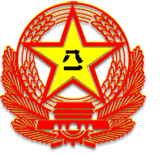 Or maybe not.
Or maybe not.
I'm just trying to figure out why the BBC's Worldwide Monitoring division would translate this otherwise mundane military personnel press release. The only real clue lies in the translator's emphasis on informing readers that nanjiang (南疆) in this case refers to southern Xinjiang.
The original notice appeared in Hong Kong's pro-CCP Wen Wei Po newspaper, but this is the BBC translation:
The People's Liberation Army [PLA] has recently undergone personnel changes, which involve the Beijing Military Region and several provincial military districts. Of the reshuffle, Lieutenant General Li Wenhua, former political commissar of the Beijing Military Region, will retire from active military service, and be replaced by Major General Huang Jianguo, political commissar of the Nanjiang [southern Xinjiang] Military District.
The obvious implication, if there is one, is that a two-star general responsible for a region of Xinjiang that saw repeated attacks before and during the Olympics is being shuffled off to Beijing as some sort of non-punishment punishment.
It reminds me of a tale I heard in Xinjiang about the president of a Bingtuan-owned agri-business conglomerate... he was caught accepting bribes (big surprise) and was determined to be unfit to continue in his position. So, as punishment, he was moved up to a higher position at Bingtuan headquarters in Urumqi, where he was in the perfect position to accept bribes from the kind of people he used to be. Whaa!? (Doing my Jon Stewart whaa!? face, if you know the one.)
Anyway, this Huang Jianguo fellow was the PLA political commissar for the area that includes both Kashgar and Kuqa. It's a fairly shadowy ranking that more or less says nothing about what he did there. From Wikipedia:
The position of political commissar has also existed and still exists in the People's Liberation Army of China. Usually, the political commissar is a uniformed military officer, although this position has been used to give civilian party officials some experience with the military. The political commissar was head of a party cell within the military; however, military membership in the party has been restricted to the lower ranks since the 1980s. Today the political commissar is largely responsible for administrative tasks such as civilian relations and counseling, and sometimes serves as second-in-command.
So, it's very unclear what exactly the BBC was trying to signal to the ever-curious Xinjiangorati, but I know it's something. Maybe. Anybody?
Hong Kong paper reports China army reshuffle
BBC Monitoring Asia Pacific - Political
September 10, 2008 Wednesday
Text of report by Hong Kong newspaper Wen Wei Po website on 8 September
Beijing, 7 September - The People's Liberation Army [PLA] has recently undergone personnel changes, which involve the Beijing Military Region and several provincial military districts. Of the reshuffle, Lieutenant General Li Wenhua, former political commissar of the Beijing Military Region, will retire from active military service, and be replaced by Major General Huang Jianguo, political commissar of the Nanjiang [southern Xinjiang] Military District. Qiu Xingbo, commander of the Guizhou Military District, has been transferred to Yunnan Military District as commander a few days ago.
The new round of PLA reshuffle, which has taken place after the Olympic Games, involves only the deputy-level commanders of the military region and commanders of the military districts in a number of provinces. Of the military region, Maj Genl Huang Jianguo of the Nanjiang Military District, which is under the Lanzhou Military Region, has been appointed deputy political commissar of the Beijing Military Region a few days ago.
Qiu Xingbo, commander of the Guizhou Military District, will assume the office of commander of the Yunnan Military District, and his vacancy will be taken over by Ling Feng, chief of staff of the Guzhou Military District.
Meanwhile, Zhang Jun, former minister of Military Transport and Communications under the Logistics Department of the Chengdu Military Region, has been transferred to the post of chief of staff of the Guizhou Military District. In the northwest, Major General Zhang Shuling, president of the PLA Xian Military Academy, has been appointed commander of the Qinghai Military District.
Source: Wen Wei Po website, Hong Kong, in Chinese 8 Sep 08
posted September 11, 2008 at 12:04 AM unofficial Xinjiang time | Comments (106)
September 08, 2008
The Anti-Ramadan Campaign

UPDATE Some keyword in the comments section is causing intermittent interuptions in access to this site from within China. If anyone figures out what the word is, please let me know so I can @lter the spelling.
Also, the NY Times has edited the text of the article from what I pasted below last night, deleting references to Artux, the Beijing Olympics, Iraq, and the likelihood of attacks during Ramadan. You may remember another Xinjiang-related unannounced correction in the NYT earlier this year.
••••
Three weeks ago the World Uyghur Congress claimed that a "Strike Hard" campaign was being planned for Xinjiang after the Olympics, during the Muslim holy month of Ramadan. We saw last week that operations are at least in the planning stages.
Now comes confirmation from the New York Times that a softer but equally insidious campaign is well underway to undermine the observance of Ramadan by large swaths of the Uyghur population:
The Web site of the town of Yingmaili lists nine rules put in place to “maintain stability during Ramadan.”
They include barring teachers and students from observing Ramadan, prohibiting retired government officials from entering mosques and requiring men to shave off beards and women to doff veils. Mosques cannot let people from outside of town stay overnight and restaurants must maintain normal hours of business. Many restaurants close in daytime hours during Ramadan because of the sunrise-to-sunset fasting.
In nearby Xinhe County, the government has decreed that Communist Party members, civil servants and retired officials must not observe Ramadan, enter mosques or take part in any religious activities during the month. Worshippers cannot make pilgrimages to tombs, so as to “to avoid any group event that might harm social stability,” according to the Xinhe government’s Web site....
The city of Artux is also preventing its teachers and students from observing Ramadan. As a result, schools have to keep serving food and water, city authorities said. As with the other governments, the overall goal is “to maintain social stability during Ramadan.”
Ah, social stability. Is there anything you can't do?
AFP also gathered some similar information from websites belonging to several Xinjiang counties. From the sites:
Faced with recent violent and disruptive activities by religious extremists, separatists and terrorists, we must step up ideological education of religious leaders and followers...
We must timely warn and stop religious believers from organizing and planning large scale prayer groups and prevent any large crowd incidents that could harm social stability...
For those that maintain beards and for the women who wear veils, we should take all effective measures to have them shave their beards and take off their veils.
I've heard rumors from Uyghurs in the past of just these sorts of schemes... free lunches and alcohol for Muslims during Ramadan, that sort of thing. And government workers have been banned from religious activities for quite some time.
Still, it seems that the effort to weaken Uyghur religious identity is stronger this year and better coordinated.
The NYT article points out that Muslim extremists have a long history of attacks during Ramadan (although not in Xinjiang). Supposedly you get extra martyrdom points and hotter virgins in heaven. But there's no evidence that recent violence has been tied to religious zeal rather than plain old anti-Han sentiments, except for a few questionable online videos from the East Turkestan Islamic Party.
By putting the screws to Ramadan like this, a long-simmering conflict that's mainly been about cultural and ethnic tension could quickly develop deeper theological roots. If the Uyghur Islamist groups currently consist of three guys in a bedroom in Pakistan, you can bet that by next year the ranks will swell as rumors spread about the Chinese effort to crush Ramadan.
It would be a shame for Xinjiang to be led down the same destructive path as so many other once moderate Muslim regions around the world.
Ramadan Curbs Imposed in China
September 9, 2008
The New York Times
By EDWARD WONG
BEIJING — Local governments in a Muslim desert region in western China have imposed strict limits on religious practices during the traditional Muslim fasting month of Ramadan, which began last week, according to the Web sites of four of those governments.
The rules include prohibiting women from wearing veils and men from growing beards, as well as barring government officials from observing Ramadan. One town, Yingmaili, requires that local officials check up on mosques at least twice a week during Ramadan.
The local governments administer areas in the western part of Xinjiang, a vast autonomous region that is home to the Uighurs, a Muslim Turkic people who often chafe under rule by the ethnic Han Chinese. In August, a wave of attacks swept through Xinjiang, the largest surge of violence in the region in years. Some local officials blamed the instability on separatist groups, and the central government dispatched security forces to the area.
The limits on religious practices put in place by local governments appear to be part of the broader security crackdown. The areas affected by the new rules are near Kuqa, a town struck by multiple bombings on Aug. 10.
It was unclear whether the rules would be relaxed after Ramadan, a holiday that some Islamic extremists have used elsewhere as a symbolic backdrop for attacks on their perceived enemies. It was also unclear how the Chinese authorities intended to enforce the rules, which appeared to run the risk of antagonizing devout Muslims who present no obvious security threat.
The Web site of the town of Yingmaili lists nine rules put in place to “maintain stability during Ramadan.”
They include barring teachers and students from observing Ramadan, prohibiting retired government officials from entering mosques and requiring men to shave off beards and women to doff veils. Mosques cannot let people from outside of town stay overnight and restaurants must maintain normal hours of business. Many restaurants close in daytime hours during Ramadan because of the sunrise-to-sunset fasting.
In nearby Xinhe County, the government has decreed that Communist Party members, civil servants and retired officials must not observe Ramadan, enter mosques or take part in any religious activities during the month. Worshippers cannot make pilgrimages to tombs, so as to “to avoid any group event that might harm social stability,” according to the Xinhe government’s Web site.
In addition, children and students cannot be forced to attend religious activities, and women cannot be forced to wear veils.
County rules also stress the need to maintain a strict watch over migrant workers and visitors from outside. Companies and families who have workers or visitors from outside the county are required to register the outsiders with the nearest police station and have the outsiders sign an agreement “on maintaining social stability.”
Some of those rules are similar to ones implemented in Beijing right before the Olympic Games began in early August.
Shayar County, which includes the town of Yingmaili, said on its Web site that migrants must register with the police, and that any missionary work by outsiders is banned. Even outside Ramadan, China is wary of missionaries doing any kind of work in the country.
The city of Artux is also preventing its teachers and students from observing Ramadan. As a result, schools have to keep serving food and water, city authorities said. As with the other governments, the overall goal is “to maintain social stability during Ramadan.”
In some parts of the world, militants see Ramadan as a good time to carry out attacks because they believe achieving martyrdom during the holy fasting month is an especially sacred act.
In Iraq, religious extremists carried out waves of bombings during Ramadan in recent years. But the Chinese government has not presented any evidence showing that separatists in Xinjiang might do the same this year.
China imposes Ramadan security crackdown in Muslim northwest
Agence France Presse -- English
BYLINE: Robert J. Saiget
DATELINE: BEIJING, Sept 5 2008
Authorities in China's Muslim-populated far northwest are seeking to prevent mass prayers and the distribution of religious material as part of a security crackdown for Ramadan, government notices said.
A series of attacks on police in Xinjiang around last month's Beijing Olympic Games left more than 20 officers and security guards dead, and at least as many attackers killed or arrested, in the biggest unrest there in years.
As the Muslim fasting month of Ramadan began, local governments this week issued orders to clamp down on security in the region and stop its ethnic Muslim Uighur population from using the holy month to foment further unrest.
"Faced with recent violent and disruptive activities by religious extremists, separatists and terrorists, we must... step up ideological education of religious leaders and followers," a notice posted on Xinjiang's Zhaosu county website said.
The county government prohibited government officials, Communist Party members, teachers and students from observing Ramadan, while warning that "any person caught forcing another to observe Ramadan" would be punished.
"We must timely warn and stop religious believers from organising and planning large scale prayer groups and prevent any large crowd incidents that could harm social stability," said a notice on the Xinhe county website.
In some areas, the crackdown also was extended to the Muslim religious practices of men growing beards and women covering their faces with veils.
"For those that maintain beards and for the women who wear veils, we should take all effective measures to have them shave their beards and take off their veils," the Shaya government said, without elaborating on how this would be done.
The county government also stepped up patrols around mosques and urged top officials to remain vigilant around the clock for any incidents that could result in social instability.
"The handing out of religious propaganda in public places by any work unit or individual is banned," the Shaya government said.
"We must strictly prohibit the playing of any audio-visual tapes, loud speaker announcements and religious drum rituals that could disrupt the Ramadan festival."
Xinhe and Shaya are near Kuqa city where up to 10 alleged Muslim attackers were reportedly killed after assaulting a local police station on August 10.
Xinjiang is a vast desert region bordering Central Asia that is home to 8.3 million Uighurs, many of whom say they have suffered decades of political and religious repression under Chinese rule.
The Uighurs established two short-lived East Turkestan republics in Xinjiang in the 1930s and 1940s, when Chinese central government control was weakened by civil war and Japanese invasion.
Phelim Kyne, a Hong Kong-based researcher for Human Rights Watch, said the postings on the government websites appeared to be the first time that such hardline religious control measures had been openly and publicly disclosed.
"We have heard of these types of measures on beards and veils, that Uighur party members and citizens who join the government are expected to distance themselves from overt cultural and religious expressions," Kyne said.
"But by putting them in black and white on government websites, they are showing that they have become much more concerned with the situation and are deepening the crackdown."
According to Dilxat Raxit, spokesman for the World Uighur Congress, the measures would only increase tensions among Xinjiang's Muslim population.
"To publicly restrict Uighurs from observing the Ramadan fast is a serious act trampling on the religious faithful," the German-based Raxit said in a statement.
"At the same time this is only going to intensify the conflict (in Xinjiang)."
posted September 08, 2008 at 10:40 PM unofficial Xinjiang time | Comments (291)
September 02, 2008
Collective Punishment

Most of you probably know that the violence has continued out in Xinjiang even after the Olympics — but let's start off with Wikipedia's description of collective punishment:
Collective punishment is the punishment of a group of people as a result of the behaviour of one or more other individuals or groups. The punished group may often have no direct association with the other individuals or groups... In times of war and armed conflict, collective punishment has resulted in atrocities, and is a violation of the laws of war and the Geneva Conventions. Historically, occupying powers have used collective punishment to retaliate against and deter attacks on their forces by resistance movements.
Which is why the purported implementation of a "10-household mutually insured system" in parts of Xinjiang to deter further terrorist attacks is so troubling. Say what you will about the Fragrant Concubine or thousands of years of Han involvement on the fringes of Central Asia, but collective punishment is the tool of a government that doesn't feel at home within its own borders.
From the HK Information Centre for Human Rights:
The "10-household mutually insured system" is being implemented in Kashi [AKA Kashgar or Keshen] and Hotan prefectures. In other words, if one person is found guilty, he will implicate members of 10 families. Those family members will be penalized in many respects, including their job opportunity and their children's education opportunity. In Urumqi, each apartment building has a "building chief" charged with the responsibility of strictly controlling outsiders from moving into the building.
The move is part of plan to do a "carpet search" of Xinjiang for terrorists ahead of National Day on October 1, with 200,000 police officers and militia troops sweeping through the transient Uyghur population in "all mobile lodges, rental apartments and remote villages."
Xinjiang is also recruiting to dramatically expand the number of anti-terrorist special forces in the region, from 2,000 to 3,000...
looks like it's going to be an interesting few months (or years) out west.
The report also notes that fear of terrorism, especially bombings on public transportation, has finally reached Beijing... although I wouldn't quite say the heightened sense of alert is anything near what you would find in New York, or, say London.
I was on the subway just a few days ago when I mentioned to the person next to me that there didn't seem to be anybody watching a pile of bags obviously belonging to migrant workers near the doors. "Aren't you afraid of terrorists?" I asked him. "No," he said, "the security in the subway is superb."
Of course, we didn't blow up in the end, but that's beside the point. What was the point again? Oh, right... collective punishment. Holy sh%t!
You should read the full report below.
BBC Monitoring Asia Pacific - Political
August 29, 2008 Friday
China conducts "carpet search" for Xinjiang terror suspects - HK centre
Text of report by Hong Kong Information Centre for Human Rights and Democracy on 27 August
[Report: "200,000 Military Police Conduct Carpet Search for Terrorist Suspects To Prevent Terrorist Strikes During the 1 October Period"]
Aug 27, 2008 - Our centre learned that, to prevent terrorist strikes from developing into another upsurge during the time when the nation marks the October 1 National Day, Xinjiang is currently mobilizing 200,000 officers and men of the public security force, the Armed Police Force and militia force to undertake a carpet search among the transient population. Some areas have even reinstated feudal society's 10-household mutually insured system - a system under which people of 10 families were liable to punishment when one person in the families was found to have committed an offence. Meanwhile, Xinjiang's "Antiterrorist Special Reconnaissance Force" is expanding its size through an urgent recruitment campaign. The force, which has 2,000 people now, will soon become a force with 3,000 people.
Our centre also learned that the dragnet-type screening of people suspected to be terrorists - a 23 August-20 September campaign the Xinjiang Law Enforcement Commission mapped out on 18 August - will be extended to 1 October and beyond. This is because more and more information shows that the "East Turkestan [Liberation Organization]" may create another wave of terrorist strikes around 1 October. The 200,000 officers and men of Xinjiang's public security force, Armed Police Force and militia force are now checking and registering the floating population and "key elements subject to control" in all mobile lodges, rental apartments and remote villages. The region has also set up additional checkpoints at important road sections between townships and between villages. The "10-household mutually insured system" is being implemented in Kashi [AKA Kashgar or Keshen] and Hotan prefectures. In other words, if one person is found guilty, he will implicate members of 10 families. Those family members will be penalized in many respects, including their job opportunity and their children's education opportunity. In Urumqi, each apartment building has a "building chief" charged with the responsibility of strictly controlling outsiders from moving into the building.
Meanwhile, Xinjiang's "Antiterrorist Special Reconnaissance Force" is urgently expanding its size. Aside from having a technical investigative detachment that owns the most advanced technological equipment, the special Armed Police Force that operates as a force under Section 16 of the Xinjiang Public Security Department, also has detachments in Urumqi, Kashi, Hotan, Ili and Aksu prefectures. Owing to the job's high risks, this 2,000-man special Armed Police Force always has problems recruiting new people. During its current enlarged recruitment campaign, the force has promised new recruits with higher pay and subsidies and special arrangements for them when they retire.
One of the tremendous changes that the Beijing Olympics have brought to the Chinese people's psyche is the fear of "terrorist bombings." During the Olympic period, most of the bus passengers, after they boarded onto a bus, would invariably look carefully around. If somebody has left a satchel or handbag on a bus or at an eatery, somebody would immediately inform the police to send a bomb expert to handle the situation. It is expected that bus passengers will do the same during the 1 October period. China will mark what it calls the 50th national founding anniversary on 1 October next year. It is for certain that there will be numerous security personnel on Beijing buses.
Source: Information Centre for Human Rights and Democracy, Hong Kong, in Chinese 27 Aug 08
posted September 02, 2008 at 08:39 AM unofficial Xinjiang time | Comments (237)
